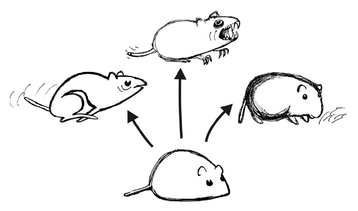Evolution of the Gut Microbiota though Adaptive Radiation of Hosts

Depiction of multidirectional selection experiment (by January Weiner)
Comparative studies have shown that host evolutionary history determines gut microbial communities in mammals. However, it is unclear how selection at the host-level may be influencing these relationships. I am collaborating with Dr. Pawel Koteja at Jagiellonian University in Krakow, Poland on an artificial selection experiment. Wild field voles (Myodes glareolus) have been selected for 13 generations for high aerobic capacity, predatory behavior, or tolerance of a low-quality diet [Link]. We have demonstrated that voles selected for the ability to thrive on a high-fiber diet have more diverse cecal microbial communities, even when they are not feeding on high fiber diets [Link].
Copyright © 2024 KOHL LAB - University of Pittsburgh
